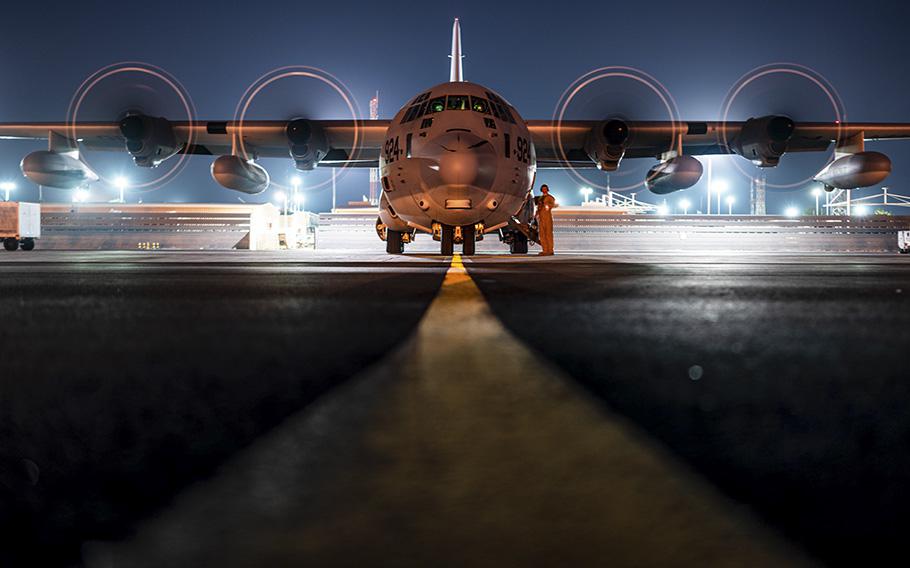Africa
Fighting still rages in Sudan despite talk of truce progress
The Washington Post May 12, 2023

A U.S. Marine Corps KC-130J Super Hercules prepares for takeoff at Camp Lemonnier, Djibouti, on May 2, 2023. (Joseph LeVeille/U.S. Air Force)
The day after the United States said that both sides fighting in Sudan recognized their basic obligations under international law, paramilitary troops showed no sign of leaving the dozen hospitals they had occupied and Arab militias launched a fresh assault on the western town of El-Geneina in the Darfur region, residents said.
The Jiddah Declaration, negotiated in Saudi Arabia's capital with U.S. and Saudi help, said both the paramilitary Rapid Support Force and the Sudanese military would recognize their obligations to civilians - including a commitment to withdraw from occupied hospitals. The document released Thursday night also spelled out a process for negotiations for a cease-fire and the desire for a monitoring mechanism.
Policing a cease-fire will be hard; it's not yet clear that the commanders of either side have complete control of their troops. Airstrikes by the military have killed many civilians, including children, and residents report rapes, looting and eviction from their homes by the RSF, which is fortifying positions in residential neighborhoods.
Both Howida Ahmed Mohammed Alhassan, a member of the Doctors' Committee, and Hiba Omer, chair of the Preliminary Committee of the Sudan Doctors' Syndicate, said nothing on the ground in Sudan had changed on Friday.
They said at least 59 out of Sudan's 88 hospitals around the country are nonfunctional due to damage from fighting, or a lack of medicines, staff or basic services like water or electricity.
Another doctor, who asked not to be named, said 17 hospitals had been bombed in the fighting and 20 were occupied by the RSF. The doctor spoke on the condition of anonymity because medical personnel have been threatened by commanders for releasing information showing them in a bad light.
On Wednesday, the United Nations' refugee chief, Filippo Grandi, told The Washington Post that the agency estimated around 700,000 people had been forced to flee their homes since fighting erupted on April 15. More than 160,000 have fled the country, he said, noting neighbors Chad and Egypt have kept their borders open, although the flow of people into Egypt has been slow because of long processing times for visas.
Resident Muhammad Ali Yahya from El-Geneina in the western region of Darfur said there had been a fresh attack on the town on Friday by Arab militias allied to the RSF at dawn. The region has seen some of the worst fighting of the conflict.
So far the civilian casualties in all the fighting, estimated in the hundreds but likely much more, have just been those caught in the crossfire rather than being directly targeted, as was the case in Sudan's previous wars, said Jerome Tubiana, a researcher and longtime observer of the region.
"We are just hoping we will not reach the stage of armed forces targeting civilians because of ethnicity, regional origin, political opinions," he said. Both sides had recruited heavily from certain tribes, he said, fueling fears of a return of the kind of ethnic violence that had dominated Darfur's 20-year civil war, when Arab militias fought groups of ethnic sub-Saharan African rebels.
The fighting has also stopped most aid operations. Around a third of Sudan's 46 million people needed food aid before the conflict erupted, but insecurity means the U.N.'s World Food Program has slashed operations. It is reaching only about of a fifth of the people it had planned to provide food to.
Neither force has yet clarified any option for safe corridors for humanitarian aid, a key demand from the international community.
"We need to have absolute clarity about what the two parties are committed to," Martin Griffiths, global head of the U.N. Office for the Coordination of Humanitarian Affairs, told The Washington Post last week by phone from Port Sudan. "Of course we want a cease-fire, but even without a cease-fire operations still need to happen . . . this is not the moon we are asking for."
In a nod to the weak command and control that has characterized the conflict, he also said local alliances would be crucial to securing aid.
"While we get commitments from the two leaders, we need to drill down into what that means for each neighborhood."
The Washington Post's Miriam Berger in Washington contributed to this report.